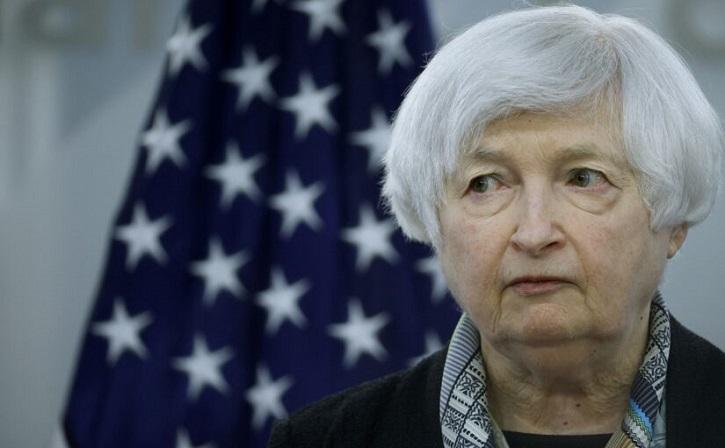
Renewable energy less important than stopping Chinese industry.
The reality is that the US wants Beijing to adopt an economic strategy that would destroy the basis of China’s growth and ensure its subordination to the US.
In this brief but incisive blog post, Canadian anti-imperialist writer Justin Podur unpacks the contradictory remarks made by US Treasury Secretary Janet Yellen during her visit to Beijing, complaining about China’s use of state subsidies in certain parts of its economy. As Justin points out, “if the market system is the best and most efficient, why would Yellen complain about China using state subsidies or protections and interfering in it? Wouldn’t that just allow the US to use the market to win the game?” And why would they want China to adopt measures that would – according to free-market fundamentalism – accelerate its rise?
The reality is that the US wants Beijing to adopt an economic strategy that “would actually destroy the basis of China’s growth and ensure its subordination to the US.” One side-effect of this is that it would cause a major disruption to the solar energy industry, in which China is dominant (Justin notes that China holds 80 percent of photovoltaic patents worldwide). As such, “the imperialist anxiety to stop the rise of Chinese industry conflicts with the green priority for a transition to renewables.” But in this battle of priorities between hegemonism and the environment, the US is siding with hegemonism. An important reminder that the struggle against the New Cold War is also a struggle to keep the planet habitable.
Janet Yellen went to China and warned them there would be consequences if they didn’t adopt a market economy. There’s so many admissions in this little statement that shouldn’t go unnoticed. If the market system is the best and most efficient, as its proponents claim, why would Yellen complain about China using state subsidies or protections and interfering in it? Wouldn’t that just allow the US to use the market to win the game? If the market is the “cheat code”, as the gamers say, then how could China “cheat” by using non-market mechanisms? The flip side of the coin is also there. If the US, as its officials repeatedly cry, is desperate to stop the rise of China, why would they advise China to take steps (like market reforms) that should, according to market theory, only accelerate China’s rise? Perhaps it is because Yellen knows market reforms would actually destroy the basis of China’s growth and ensure its subordination to the US.
I want to talk about one of these Chinese industries that has grown up under state subsidy and protection that is – again according to Western environmentalists – very important in the struggle against climate change: photovoltaics (solar panels) and other renewable energy technologies.
There’s this video from a youtube channel called Tech Teller that outlines some details about the rise of China’s PV industry. The news hook for the video was the arrest of a Chinese PV executive, Pu Yonghua of Jiangsu Green Power New Energy, in Germany. It looked like Germany was going to pull a Canada (with the kidnapping of Meng Wanzhou of Huawei) and get into a pointless years-long conflict at US urging. But it looks like Pu Yonghua was released a few days later.
Tech teller’s video provides some “startling figures” about China’s dominance in PV:
- of 150,000 PV patents worldwide, Chinese companies hold 120,000 of them.
- The top ten PV companies in the world are all Chinese.
- Chinese PV has a market share of 60% in the US and peaked at 95% in the EU. EU’s domestic PV capacity accounted for 3% of market share there.
- 200 countries are customers of Chinese PV products.
The EU’s attempt to raise its renewable energy use to reduce its dependence on Russian gas is ultimately a plan to transfer its dependence on Russia — to China.
China’s PV industry is so far ahead that the US and EU industries are going to have a lot of difficulty catching up. This despite, as the video tells, depraved and repeated attempts to stop China from developing by both the US and EU.
There are problems with PV, as environmentalists like Stan Cox have noted, including the mining footprint of rare earths and the use of fossil fuels in their production. But there is a Green consensus on the need to get off of fossil fuels and PV technology will be key to get there. The imperialist anxiety to stop the rise of Chinese industry conflicts with Green the green priority for a transition to renewables. It is another case of Western imperialism vs the environment. If you believe climate change is an existential issue for the species like nuclear war, you could use Chomsky’s phrase and consider it a choice between Hegemony or Survival.
Which do you think the US will choose?
Source: Friends of Socialist China, July 9, 2023. https://socialistchina.org/2023/07/09/renewable-energy-development-is-less-important-than-stopping-chinese-industry/
READ also: China’s efficient socialist economy This excellent article was posted in China Environment Net on June 22, 2023. The difficulty the U.S. faces in its current attempts to damage China’s economy is analysed in detail by John Ross, who is a senior fellow at Chongyang Institute for Financial Studies, Renmin University of China.